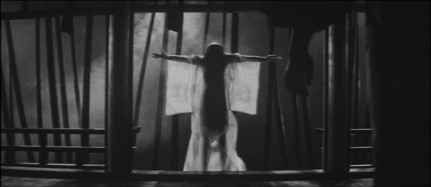Movie: Kuroneko
Released: 1968
Directed by: Kaneto Shindo
Welcome to Stuck Up Cinema, a place where I, Justin, can be as stuck up as I want about whatever I want. Today’s subject is the film Kuroneko (Black Cat) released in 1968. It’s a horror film, but if you’re expecting a jump scare slasher then you’ll be disappointed. Kuroneko is more of a Japanese ghost folk tale, and it flips between violence and eroticism almost too well. Kuroneko follows the story of a mother and her son’s wife being attacked, raped and murdered by a bunch of samurai. The samurai burn down the house the women live in and the two corpses are visited by a black cat. Fast forward and these two women are back in the form of vengeful spirits luring samurai back to their house to kill them. Kuroneko is an exercise in atmosphere, and it is just ripping at the seams with it.

The story is told in three acts, the first of which features the two spirits killing a small handful of samurai. Their method is simple, the young spirit (Shige, played by Kiwako Taichi) finds a samurai who is on patrol at night. She requests that the samurai escort her home because it is dangerous to walk alone. The samurai leads her home and then Shige invites the samurai in. When inside the mother (Yone, played wonderfully by Nobuko Otowa) plays host and eventually leaves the samurai and Shige alone. This is when Shige uses her good looks to lure the samurai into bed and then WHAM she rips their throats out.
The story takes a shift from violent to erotic when a young warrior (Gintoki, played by Kichiemon Nakamura) luckily kills a great warlord and is tasked in hunting down and killing these two spirits. The plot TWISTS quite quickly when we find out that Gintoki is Yone’s son and Shige’s husband. This is played remarkably when Gintoki comes across Shige’s spirit while he is on patrol. He notices who she is and, at the same time, she is very well aware of who he is. She plays it coy and quiet, not wanting to bring attention to herself, she becomes almost passive around a samurai she is supposed to kill. Gintoki eventually finds himself back at his old house and he spends a passionate night with Shige… and the spirits don’t kill him in the process. This is when the story begins to get interesting and intense and begins a very tight journey up to the film’s amazing and tense climax.

The film is available on the Criterion Collection, both DVD and Blu-ray and I suggest going out and picking this one up. For special features it has:
- Video interview with director Kaneto Shindo
- Video interview with film critic Tadao Sato
- Theatrical Trailer
- Booklet included with an interesting essay by Maitland McDonagh and an excerpt from film scholar Joan Mellen’s 1972 interview Shindo
This is a horror movie, stuff like the Saw series and the recent shitstorm My Soul to Take are abominations compared to a film like this. This movie is masterclass horror filmmaking and it does so without trying to scare you cheaply. I wouldn’t even say the movie tries to scare you outright, it places you in the situation and lets you feel, as an observer, the emotions you normally would in the situation. It doesn’t tell you outright you should feel tense when Gintoki comes across Shige’s spirit for the first time; you know that you should feel tense, the movie’s atmosphere and style is what makes you feel the tension. We’ve watched for the first thirty or so minutes what Shige and Yone do to samurai, how will they react when their own son and husband, now a samurai, comes across their paths.
It’s a slow film, yes, but the pacing like this was deliberate and normal. The audience didn’t require cheap scare tactics every fifteen minutes to be reminded that they’re watching a horror movie. It’s even a testament to how horror movies are doing critically in this day and age that they need to be reevaluated. Horror can still exist and a movie can build an atmosphere first and expectations second. A film should be a journey, it should suck the audience in, violently molest all their emotion and sensations, and then throw them back down on the ground. They should take something from the film, even if it’s a horror movie. A horror film shouldn’t be associated with lame tricks and cliches, horror should be an accomplished genre like any other. Films like Kuroneko are a testament to this; approach it less in a blood and guts way and more in an atmospheric way. I mean, what are we more scared of as humans, spending a universe alone suffering in a pit of sludge, or seeing some random nobodies get ripped apart by some stupid and convoluted ‘trap’?
Kuroneko: 8/10

